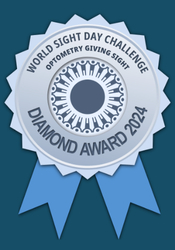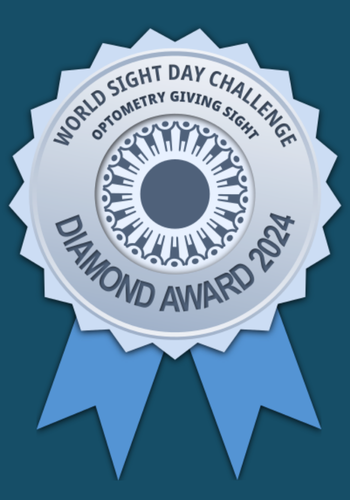Comprehensive Eye Exams in Calgary
An annual comprehensive eye exam is the best way to detect the earliest signs of a problem that may place your eye health at risk.
Children's Eye Exams
Children should receive their first eye exam by one year of age, then annually thereafter. About one in seven children will have an eye disorder that may affect their performance in school.
Children’s eye exams include the following tests:
- Test for vision, eye coordination, and focusing (a child does not need to know their letters to get an eye exam)
- Test for refractive error, or need for glasses
- Testing for eye health concerns – an Optomap retinal exam is recommended to ensure your child’s eyes are healthy (every two years)
Adult Eye Exams
All adult eye exams include the following:
- Wavefront Refraction for the most accurate eyeglass prescription
- Optomap Retina scan to screen for eye disease
- Doctor’s consult to review findings and answer any
questions - your personalized len prescription to protect and enhance your vision for all your daily activities
Eye Exam Frequently Asked Questions
How often should adults get their eyes checked?
We typically recommend annual eye exam visits for most adult patients.
What can I expect during an adult eye exam?
During an adult eye exam, your eyes will be meticulously examined using advanced computerized equipment to measure various factors such as eye curvature, eye pressure, baseline eyeglass prescription, and high-resolution images. Our highly skilled eye doctors in Calgary and Cochrane will inquire about your medical history, medications, eye health history (including your relatives'), and any symptoms you may be experiencing, such as
blurred vision or discomfort. After analyzing all the results and conducting additional tests, your eye doctor will provide you with a comprehensive diagnosis and treatment plan, if applicable. The results will be thoroughly explained to you, and you are encouraged to ask any questions you may have. Additionally, you will receive a thorough consultation on lenses and frames to ensure that you receive personalized advice on materials, style, and technology that are perfectly suited to your needs and lifestyle.
What should I do to prepare for an eye exam?
To properly prepare for an eye exam, it is recommended to gather all the glasses and sunglasses currently in use, as well as any contact lenses and their respective packaging (foil tops from the plastic packaging). Providing a comprehensive list of medications and health conditions under treatment or monitoring is also highly beneficial. Additionally, it is important to communicate to your eye doctor any symptoms experienced, such as blurry vision, pain, irritation, discomfort, headaches, etc.
How long does an adult eye exam usually take?
The duration of an adult eye exam typically lasts for approximately one hour. It is important to allocate sufficient time for a comprehensive assessment process and to ensure that there is ample opportunity for thorough discussions with our doctors and consultants. This is where you will gain the most valuable insights regarding your specific condition(s), risk factors, and available treatment options.
Will my eyes be dilated during the exam?
Patients with certain health conditions like diabetes, risk factors like high levels of nearsightedness, or symptoms such as flashes of light or “floaters” may be recommended to undergo a dilation during the eye exam. Our staff will inform you in advance if a dilation is necessary. If you are not prepared for the potential side effects (blur and light sensitivity), we can always reschedule this part of the exam.
What is a visual acuity test and why is it important?
A visual acuity test provides a measurement of how well you can see. Your result is compared against a standard known as “Snellen acuity” which allows it to be recorded in numerical format (eg. “20/20, 20/30”…etc.). This helps your eye doctor decide if your vision is normal (at expected level) or abnormal (below expected level). If abnormal, tests are then performed to find out if it is correctable (able to return to normal with corrective lenses) or not (due to disease or other process). Your “best correctable” vision is then recorded in your medical chart and reviewed each year to ensure it’s stable and consistent.
What is a refraction and why is it important?
A refraction is a series of tests done to establish the eyeglass or contact lens prescription (strength and parameters of the lenses needed to correct your vision). It’s important to determine whether abnormal vision, if present, is correctable with glasses or contact lenses. Further tests are performed to determine the cause of the reduced vision if a refraction does not produce normal or expected levels of vision.
Can an eye exam detect problems beyond vision issues?
An eye exam can detect problems beyond vision issues. Many systemic conditions often manifest themselves during an eye exam, such as high cholesterol resulting in narrowing or hardening of retinal blood vessels, diabetes and high blood pressure causing retinal hemorrhages, and certain forms of cancer showing up in scans of the interior of the eye. Our eye doctors in Calgary and Cochrane frequently identify signs of health problems before their patient becomes aware of them.
How often should I replace my eyeglasses or contact lenses?
Eyeglasses: these should be replaced when your prescription changes, when the lenses become scratched, or coatings start to fade. Other reasons to replace glasses include older, brittle, discoloured frames, or frames that are uncomfortable or no longer hold their adjustment. Contact lenses: depending on the type of lens, the replacement schedule will vary from daily, weekly, biweekly, monthly, or longer. Your eye doctor will provide appropriate advice on when to replace each pair of contact lenses. The important thing to remember is that you can’t always feel when a contact lens needs to be replaced, therefore replacing according to the prescribed interval is critical to maintain optimal eye health and best vision.
How can I maintain good eye health as an adult?
To maintain good eye health as an adult, it is important to have annual eye check-ups. Many eye diseases and conditions may not show symptoms in the early stages, when they are most easily treatable. It is also recommended to wear sunglasses to protect your eyes from harmful UV rays when outdoors. Leading a healthy lifestyle,
consuming foods high in antioxidants, avoiding unhealthy food options, exercising regularly, and refraining from smoking are all beneficial for maintaining eye health. Your eye doctor will provide more specific advice during
your next eye exam, based on any identified risk factors during your comprehensive assessment.


